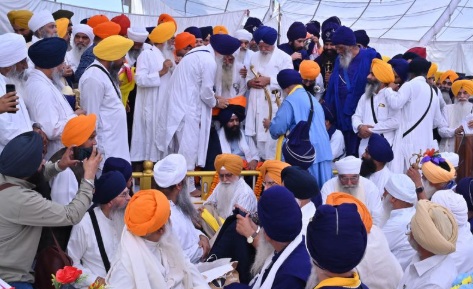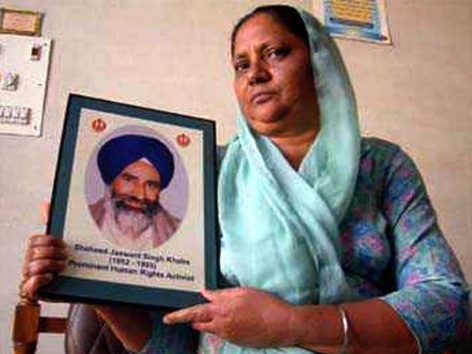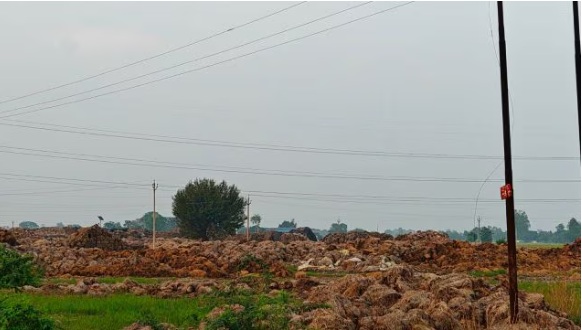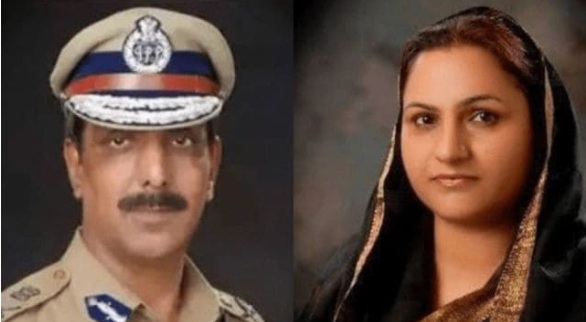Sikh Groups Ratify 'Jathedar' Gargajj, DSGMC Sacks Former Presidents
Panjab: Delhi manipulates pollution data; 96% dip in straw fires since 2020; over 5,300 acres washed away in floods. Sikh: Groups ratify Jathedar Gargajj; DSGMC Sacks Former Presidents; Second women raped in UK; Second truck accident in US—and more stories.

Sikh Groups Ratify 'Jathedar' Gargajj, DSGMC Sacks Former Presidents
Several Sikh bodies that had been opposing Giani Kuldip Singh Gargajj’s appointment as the officiating Jathedar (leader) of the Sri Akal Takht Sahib (Eternal Throne, AT) tied a ceremonial turban to him at a special program on 26 Oct. Through this gesture, they gave their assent to Giani Gargajj as the AT Jathedar. The event was organized at Takht Sri Kesgarh Sahib, Anandpur Sahib by the Shiromani Gurdwara Parbandhak Committee (SGPC)—the management body that assumes powers to appoint and remove heads of the Panjab-based Takhts (Thrones). The event coincided with the beginning of a month-long series of events being held by the state government and the SGPC to commemorate the 350th martyrdom anniversary of Guru Tegbahadar. This comes days after Gaini Gargajj delivered an uninterrupted address from AT's rostrum on Bandi Chhor Diwas (Free Prisoner's Day). On 6 Jun, ‘Operation Blue Star’ anniversary, Nihang (traditional Sikh warrior) groups and several other Sikh organizations had forced Gargajj to refrain from delivering the annual address to the Sikhs. In March 2025, Giani Gargajj was hurriedly appointed AT Jathedar in the middle of the night to avoid clashes with Nihang groups and Damdami Taksal (Sikh seminary) which opposed his appointment. However, even though opposing Sikh groups now accept Giani Gargajj as AT Jathedar, the core issues of sacking of former Jathedars who had pronounced the tankhah (salary, implying punishment) on Sukhbir Singh Badal and other Shiromani Akali Dal (SAD) leaders in Dec 2024 and the selection of Giani Gargajj as AT Jathedar remain. Giani Gargajj is widely seen as Badal’s appointee through the SGPC which the recent ceremony does not alter. Instead, it ratifies the appointment. Meanwhile, on 25 Oct, the general house of the Delhi Sikh Gurdwara Management Committee (DSGMC) revoked the membership of three past SAD presidents—Paramjit Singh Sarna, Harvinder Singh Sarna, and Manjit Singh GK. The revocation was over charges of misappropriation of Gurdwara funds and breach of trust. According to DSGMC president Harmeet Singh Kalka, who is from Bharatiya Janata Party (BJP), the decision was taken after consideration of long-pending complaints and in accordance with the directions received from the director Gurdwara Elections and Delhi's BJP government (earlier coverage).

Bibi Khalra Supports Independent Mandeep Singh in Tarn Taran By-poll
24 Oct was the last day for the withdrawal of the nominations for the Tarn Taran Assembly by-poll scheduled for 11 Nov. Papers of six people were rejected, five withdrew from the race, and 15 candidates are left in the fray. Political parties in Panjab have intensified their campaigning. Panthic (Sikh collective) activist Bibi Paramjit Kaur Khalra, wife of the martyred human rights activist Jaswant Singh Khalra, has urged voters to support independent candidate Mandeep Singh backed by Akali Dal (Waris Panjab De). Bibi Paramjit's appeal comes after the party, led by jailed Member of Parliament Amritpal Singh, was reportedly unable to persuade her to contest the election. Mandeep is the brother of Sandeep Singh alias Sunny who is an undertrial and in jail. Declaring Mandeep as the 'candidate of the entire Panth,' Bibi Khalra called upon Sikhs to unite and ensure his success in the by-poll. According to the 2011 Census, the Sikh population is 93% in Tarn Taran district. The Assembly constituency is much smaller than the district but has a similar proportion of population. On 25 Oct, Shiromani Akali Dal (SAD) president Sukhbir Singh Badal staged a protest against police for registering 'false' cases against SAD workers. The previous day, SAD filed a complaint with the Panjab Chief Electoral Officer against Tarn Taran Senior Superintendent of Police Ravjot Kaur Grewal, accusing her of acting on behalf of the ruling Aam Aadmi Party. SAD has fielded Principal Sukhwinder Kaur Randhawa who is part of a Dharmi Fauji (righteous soldier) family as her husband had deserted the Indian Army following ‘Operation Blue Star’ in 1984. Chief Minister Bhagwant Singh Mann, accompanied by ruling AAP's Panjab affairs in-charge Manish Sisodia, addressed party volunteers in favor of their candidate Harmeet Singh Sandhu. He said, 'They call this a semi-final to the 2027 poll, but this is not a game, this is a vote for truth and development'. On 26 Oct, at the time of the AAP roadshow, thousands of employees, especially of the Aam Aadmi Clinics, were protesting in the town stressing on acceptance of their demands (earlier coverage).

Second Racially Motivated Attack on Sikh Woman in UK
On 25 Oct, a 20-year-old Sikh student was walking alone through a dimly lit street in the Park Hall neighborhood in Walsall, UK when she was attacked. She ran to her home but the attacker tore down the door, assaulted and raped her. The police said the attack was accompanied with racial slurs and classified it as a 'racially aggravated' offence. The racially aggravated category under UK law increases the severity of the crime because of its discriminatory motive. On 27 Oct, a white 32-year-old man was arrested by the West Midland Police. UK Home Secretary Shabana Mahmood said, 'The racially aggravated rape in Walsall is a horrific crime. My thoughts are with the victim and her family.’ Sikh Federation UK said, 'West Midlands Police have now had two racially aggravated rapes of young women in their 20s in the last two months and urgently need to find those responsible.' The police has made a few arrests before releasing the suspects on bail in their investigation into the racially aggravated rape of a British Sikh woman in Oldbury in September. Sanam Arora, chair of the National Indian Students and Alumni Union (NISAU) UK said, 'As a woman, a Sikh, and a first-generation immigrant, I am heartbroken by this second racially motivated sexual attack in as many months.’ Preet Kaur Gill, a Member of Parliament from the ruling Labour Party, condemned the incident, 'Deeply shocked and saddened that we are hearing of yet another racially aggravated rape this time in Walsall.' The attack has led to outrage among the community and rights groups. Outside the local Gurdwara, dozens gathered in a candlelight vigil for the survivor. 'This is not just about one woman,' said Harpreet Singh, spokesperson for the Sikh Federation UK. 'It is about protecting every member of a community that should feel safe, valued, and equal.' Across Walsall’s tightly knit South Asian neighborhoods, residents expressed both solidarity and fear. With a population of around 280K, and a South Asian community comprising nearly one-fifth of its residents, Walsall has long been hailed for its diversity (earlier coverage).

Second Sikh Truck Driver Crash in US, Fraternity Under Fire
On 23 Oct, US police arrested a 21-year-old Sikh truck driver Jashanpreet Singh for causing a crash that killed at least three people and injured several others in Southern California. According to the police, Jashanpreet’s 18-wheeler semi-truck plowed into slow-moving traffic on Interstate 10 in San Bernardino County. His blood reports show he was allegedly under the influence of intoxicants. The US Department of Homeland Security said Jashanpreet was not a lawful immigrant and US Immigration and Customs Enforcement has lodged a detainer following his arrest. Jashanpreet had supposedly illegally crossed the southern US border in 2022 and was released under the former US President Joe Biden administration’s 'alternatives to detention' policy pending an immigration hearing. He has Employment Authorization Documents valid up to 2030 and a commercial driver's license to operate a semi-truck. His family has denied claims that he was intoxicated while driving saying he is an Amritdhari (initiated Sikh, forbidden to indulge in substance abuse). Jashanpreet has pleaded not guilty to three counts of gross vehicular manslaughter while intoxicated and one count of driving under the influence of a drug. His next court appearance is on 4 Nov, requiring a Panjabi interpreter. Jashanpreet appeared in court bareheaded raising concerns about his treatment in jail. An online petition has called for fairness and urged the authorities to ‘return his turban respecting his rights and dignity as a Sikh.’ In August, another Sikh Harjinder Singh—who entered the US illegally in 2018 and obtained a California commercial license—was charged in Florida for a crash that also killed three people. The two incidents have placed about 100K Sikh immigrant truck drivers in the US under scrutiny. They have spurred online vitriol against Sikhs who often desire high-paying trucking jobs in the US which allow Sikh men to wear beards, uncut hair, and turbans. Meanwhile, Democrat Tom Suozzi has written to the US War Secretary Peter Hegseth, urging reconsideration of a policy requiring military personnel to shave beards, affecting Sikh Americans and others with religious or medical obligations (earlier coverage).

Delhi Govt Manipulates Data to Prove a Clean 'Diwali' While People Suffer
Delhi woke up to a thick haze on 22 Oct, a day after millions of people celebrated the Diwali (Hindu festival of lights) with fireworks, marking the beginning of the pollution season that has become an annual blight on India’s capital. Since 2020, the sale and bursting of firecrackers were banned in Delhi during Diwali due to their contribution to the deadly smog that engulfs the city as winter sets in. However, the Bharatiya Janata Party (BJP) is in power in Delhi this year. The government petitioned the Supreme Court of India which permitted 'green' crackers. No one heeded the green part. Is the celebration and pride dependent on noise and pollution? To the citizens' detriment and obscuring accurate data, while the Central Pollution Control Board (CPCB) reported AQI levels well below 400, international applications like Swiss Air’s IQAir showed AQI figures crossing 2K in several areas. One reason for variance is the number of parameters each of them uses. Two, is in data sources: while the CPCB relies on analyzer-based reference-grade monitors, IQAir's index is largely sensor-based. Three, CPCB’s calculations are based on 24-hour average concentrations while IQAir reports AQI more frequently, which can lead to significantly higher readings. Four, BJP manipulated data by using sprinklers near sensors and bringing down the readings. All these did not stop the Delhi Environment Minister Manjinder Singh Sirsa from accusing the Aam Aadmi Party (AAP) ruled Panjab for polluting Delhi. Sirsa accused AAP chief Arvind Kejriwal of forcing Panjab farmers to burn paddy straw to cause air pollution. He said farmers were covering their faces while burning straw but that is how farmers set fires to avoid being affected by smoke. An X handle @epanchjanya shared a video clip showing farmers burning paddy straw. The video has proved to be fake, from Nov 2024. Sirsa also accused AAP of earlier banning firecrackers to appease a particular community (Muslim) and now criticizing the festival. ‘Diwali is a Sanatan Hindu festival, why are you cursing the festival?’ This jibe fits the pattern of BJP’s attempt to whip up majoritarian support instead of addressing facts (earlier coverage).

Panjab Sees 96% Dip in Straw Fires Since 2020
The total number of stubble burning cases has now risen to 743 across Panjab. In the last week, the state has witnessed 328 stubble-burning cases due to acceleration in paddy harvesting. 266 First Information Reports have been registered, leading to 296 red entries in the revenue records and a total penalty of USD 19K on farmers of the state. The numbers are still very low compared to 10,909 farm fires in 2024 and 36,663 in 2023. An analysis of the data on stubble-burning incidents between 15 Sep–21 Oct shows 1,729 cases of stubble burning across six states—Panjab, Haryana, Uttar Pradesh, Delhi, Rajasthan, and Madhya Pradesh. During this period, Panjab recorded 415 incidents, the lowest in the past six years. Since 2020, the incidents of stubble burning in Panjab have reduced by 96%. Also, the share of stubble burning in Delhi's Particulate Matter (PM) 2.5 levels has remained around 1% on most days so far this season. The highest contribution from stubble burning was PM 2.6% on 17 Oct. Meanwhile, in Panjab, the biomass power plants are not working to full capacity. The Jalkheri biomass power plant, in Fatehgarh Sahib district, is a 10-MW unit originally commissioned by the Punjab State Power Corporation Limited (PSPCL) in 1992. It was shut down shortly after commissioning but recommissioned in June 2024 after being leased to a private player. The plant, fully renovated by the company, has a stated capacity to consume 100K tonnes of paddy stubble annually. While the plant is reportedly operational and supplying power to PSPCL under a purchase agreement, locals question why straw from 2024 is languishing outside the plant? 'The plant is working and claims to be 100% environment-friendly. Then why was this stock collected if it was not going to be used?' asked Surjit Singh, a villager. Amid the ongoing campaign against stubble burning, farmer leaders say such neglect sends a contradictory message. Jagmohan Singh Patiala, state general secretary of farmers’ union Bhartiya Kisan Union (Dakaunda) said, ‘If they want to stop stubble burning, the area should be cleared and prepared for fresh storage’ (earlier coverage).

Over 5,300 Acres Washed Away in Floods; Paddy Procurement Issues
Over 5,300 acres of land, spread across 15 of the 23 districts in Panjab, has been washed away in the recent floods that ravaged the state in August–September 2025. The maximum land was washed away in Amritsar (1,515 acres), followed by Ferozepur (1,101 acres), Gurdaspur (544 acres), Nawanshahr (539 acres), Kapurthala (376 acres), Ludhiana (264 acres), Fazilka (244 acres), Mohali (208 acres), Pathankot (118 acres) and Jalandhar (100 acres). In each of Tarn Taran, Patiala, Hoshiarpur, and Moga districts, less than 100 acres of land was washed away. On 23 Oct, a socio-political organization Misl Satluj, demanded the government allot land to those who have lost land and offer better compensation for those affected by the floods. President of Misl Satluj Ajaypal Singh Brar said, 'People with unregistered land are facing a double issue. No inspection is done on their land and they do not get any compensation for their farmland they have been tilling since 1947.' Meanwhile, the Panjab government has decided to carry out desilting operations at 85 sites in rivers Ravi and Satluj. The government estimates the deposits at 19K million cubic feet is worth USD 95M. But the state government’s scheme that farmers own the sand in their fields has led to a steep 30-35% fall in sand prices. Concurrently, just 6420 MT of paddy has been procured in more than a month since paddy procurement started in Panjab. Farmers are complaining despite low moisture paddy being available in grain markets for the last 10-15 days, it is not being procured. Also, rice shellers are now storing hybrid paddy varieties. In 2024, the same shellers had claimed the hybrid variety had a lower Out Turn Ratio (OTR), the proportion of rice obtained from paddy after milling, than what is mandated by the Food Corporation of India (FCI). The FCI requires a minimum OTR of 67%, while the yield had only 60-63% OTR. The reason is shellers are worried they won’t have enough paddy to keep their mills running. They prefer buying hybrid paddy than facing a shortfall, even as the OTR might be slightly lower (earlier coverage).

Kangana Regrets Tweet, MPLAD Funds & Sikh as J&K RS
On 27 Oct, the court of Judicial Magistrate First Class, Bathinda granted bail to Bharatiya Janata Party (BJP) Member of Parliament from Himachal Pradesh’s Mandi constituency in a defamation case over a derogatory tweet made by her during the Farmers’ Protest 1.0 (2020-21). Kangana had shared a photograph of Mahinder Kaur, an elderly woman farmer from Bahadurgarh Jandian village, comparing her with Bilkis Bano, the elderly woman who became a symbol of the Shaheen Bagh protests. Kangana had claimed such women were 'available for INR 100’ (USD 1.13) to join protests; the remark drew widespread criticism. Mahinder had filed a defamation complaint in January 2021. Kangana had sought exemption from the case through the Panjab and Haryana High Court and even the Supreme Court of India; both had rejected her requests. Mahinder's advocate Raghbir Singh Behniwal contested Kangana’s claim that she had retweeted by mistake and not targeted anyone in particular. Kangana regretted her tweet and sought to apologize to Mahinder. But Mahinder was not present in the court due to ill health. Mahinder's husband Labh Singh said Kangana has never apologized in the past. The next hearing is on 24 Nov. Meanwhile, on 28 Oct, Panjab BJP Scheduled Caste Morcha vice-president Paramjit Singh Kainth questioned the under-utilization of the Member of Parliament Local Area Development (MPLAD) funds by the Aam Aadmi Party’s Rajya Sabha (Upper House of Parliament, RS) members. Kainth said: 'Six out of seven Rajya Sabha MPs under the AAP govt led by chief minister Bhagwant Singh Mann have spent less than 27% of their allocated funds between 2022–25, disappointing the people of Panjab.' The RS MPs spent only USD 3M out of a total of USD 11M. The shortfall is despite funds being distributed over three years. Concurrently, in Jammu and Kashmir, the ruling National Conference (NC) won three Rajya Sabha (Upper House of Parliament) seats and the BJP won one seat after voting on 24 Oct. The NC winners are Choudhary Mohammad Ramzan, Sajjad Ahmed Kichloo, and a Sikh party treasurer Gurwinder Singh Oberoi (earlier coverage).

Aqil’s Death & Bhullar’s Arrest Highlight Rot in Police
On 16 Oct, Aqil Akhtar, son of former Panjab Director General of Police Mohammad Mustafa and former Panjab Indian National Congress minister Razia Sultana was found dead in his home in Panchkula. In a social media post on 3 Oct, Aqil, had shared a picture of a diary and written, 'In case I die, this diary has my dying declaration. And I must be checked for aluminum phosphide poisoning.' The diary has now been found and the head of the Special Investigation Team, Assistant Commissioner of Police Vikram Nehra said, 'Some things are written in the diary, and we are investigating them...many notes are written on different dates’ and that certain items found at the scene ‘prima facie seem to be related to drugs.’ These items have been sent to the Forensic Science Laboratory for examination. Mustafa who led Panjab’s fight against drugs as head of the Special Task Force in 2018, says his greatest battle was not in the field but within his own home. Mustafa said, 'I could deal with terrorists (referring to days of militancy), but not my addict son. In the last 18 years, we lived through hell.' Human rights organization Ensaaf lists Mustafa responsible for 18 cases of abduction or disappearance and/or extrajudicial killings in the early 1990s. This case and the arrest of Deputy Inspector General Harcharan Singh Bhullar by the Central Bureau of Investigation on 17 Oct has highlighted other corruption cases involving Panjab Police. In early 2024, Deputy Superintendent of Police Vavinder Mahajan, previously hailed for busting a pharmaceutical drug smuggling ring, turned fugitive after being booked for taking a USD 51K bribe from a suspect in the same case. In August 2024, Assistant Commissioner of Police Nirdosh Kaur from Ludhiana’s Women’s Cell was arrested alongside her aide Beant Singh for demanding USD 680 in bribes to resolve a matrimonial dispute. In February 2024, two Assistant Sub-Inspectors (ASIs) were caught in separate Vigilance Bureau traps. ASI Chattar Singh accepted USD 113 to shield a woman from a false theft charge, while ASI Narata Ram took USD 90 to release an impounded vehicle (earlier coverage).

The Journey of Sikh Sacred Music Across Borders
Brian Bassanio Paul writes on the journey of Sikh sacred music in Pakistan, home to approximately 20K Sikhs, a small minority compared to the millions who lived in Panjab before the 1947 Partition of India. There are roughly 200 historical Sikh shrines noted by Iqbal Qaiser in the book Historical Sikh Shrines in Pakistan. The Pakistan Sikh Gurdwara Prabandhak Committee (PSGPC) currently manages around 21 Gurdwaras. In these sanctuaries, kirtan (hymn singing) is the heartbeat of Sikh liturgical life. The Guru Granth Sahib (Sikh scripture and charter, GGS) stands out among world religious texts, which are arranged by rags (musical mode). The first custodians of Sikh kirtan were the rababis (rabab instrument players) who were Muslim musicians; Bhai Mardana accompanied Guru Nanak, the first Sikh Sovereign. Families such as Balwand–Satta and Babak-Chatra transmitted Gurbani (GGS verses) through generations. Rababis performed in Sikh shrines and interfaith gatherings. Many rababis migrated to Pakistan after the Partition and the tradition nearly vanished. Today, a few descendants remain but their role in regular liturgical kirtan is almost gone. Now, ragis (hymn singers), introduced by Guru Arjan, the fifth Sikh Sovereign, form the backbone of Sikh kirtan. The Partition disrupted the guru-shishya (master-disciple) lineages. It also scattered manuscripts and destroyed instruments. Many Sikh ragis migrated to India; many rababis lost their congregations. After 1947, the most noticeable change in instruments was that the harmonium, a European reed organ from the 19th century, took over. It replaced native string instruments such as the rabab, sarinda, sarangi, dilruba, and taus. The tabla (pair of hand drums) replaced the pakhawaj, mridang, and jori. Today, the harmonium and tabla dominate. This raises questions about temperament and microtonality for the harmonium fixes pitch, which somewhat limits ‘rag’ fidelity. Regula Qureshi, an ethnomusicologist, argues that this alters the very ontology of Gurbani music. Festivals, diaspora support, grassroots teaching, and digital connectivity provide pathways for renewal. Sikh music in Pakistan is more than a set of hymns. It is testimony to survival, a sign of human will to keep singing even when history tried to still the voice. However, in Indian Panjab there is now an effort to revive the original string instruments.
Notes
Updates
- AU: Guru Nanak lake debate resurfaces (earlier coverage).
- NZ: Navjot Singh faces deportation to India because parents overstayed.
- IN: Former MP Sajjan Kumar challenges his conviction in Sikh Genocide case (earlier coverage).
Suggested Reading
Henri Tiphagne in The Wire: NHRC India's downgrade in Geneva will be a humiliation for world's largest democracy.
Like what you're reading? Subscribe to our top stories.
Liv Forum provides a digest of analysis on major issues facing Indian (East) Panjab and Sikhs globally.
In accordance with our Privacy Policy, we will never share or sell the information of our subscribers.
PM Modi Visits Dera Sachkhand Ballan; BJP Wins Chandigarh Mayoral Elections
Panjab: PM Modi Visits Dera Sahkhand Ballan; BJP Wins Chandigarh Mayoral Elections; Trump Announced US Tariffs To Be Lowered; India-EU Sign FTA; CM Mann Invokes Bhai Kanhaiya in SYL Talks with Haryana. Sikh: Police Picks Up Two from Darbar Sahib; Panjab-based Sikh Organizations Commemorate 1986 Sarbat Khalsa—and more stories.
Delhi Court Acquits Sajjan Kumar in 4th 1984 Sikh Genocide Case
Panjab: Rally by independent journalists; Operation Prahar against gangsters & associates. Sikhs: Sajjan Kumar acquitted in 4th Sikh Genocide case; US Bill to prevent discrimination against Sikhs; UK report flags rising anti-Sikh sentiment—and more stories.


